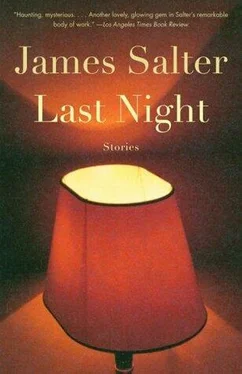James Salter - Last Night
Здесь есть возможность читать онлайн «James Salter - Last Night» весь текст электронной книги совершенно бесплатно (целиком полную версию без сокращений). В некоторых случаях можно слушать аудио, скачать через торрент в формате fb2 и присутствует краткое содержание. Год выпуска: 2005, ISBN: 2005, Издательство: Vintage, Жанр: Современная проза, на английском языке. Описание произведения, (предисловие) а так же отзывы посетителей доступны на портале библиотеки ЛибКат.
- Название:Last Night
- Автор:
- Издательство:Vintage
- Жанр:
- Год:2005
- ISBN:9781400078417
- Рейтинг книги:3 / 5. Голосов: 1
-
Избранное:Добавить в избранное
- Отзывы:
-
Ваша оценка:
- 60
- 1
- 2
- 3
- 4
- 5
Last Night: краткое содержание, описание и аннотация
Предлагаем к чтению аннотацию, описание, краткое содержание или предисловие (зависит от того, что написал сам автор книги «Last Night»). Если вы не нашли необходимую информацию о книге — напишите в комментариях, мы постараемся отыскать её.
Last Night — читать онлайн бесплатно полную книгу (весь текст) целиком
Ниже представлен текст книги, разбитый по страницам. Система сохранения места последней прочитанной страницы, позволяет с удобством читать онлайн бесплатно книгу «Last Night», без необходимости каждый раз заново искать на чём Вы остановились. Поставьте закладку, и сможете в любой момент перейти на страницу, на которой закончили чтение.
Интервал:
Закладка:
— Make up something. I don’t care.
IN THE MORNING he got up late and was in the kitchen, the smoothness of sleep still on him. Anna had gone off. My hands were trembling.
— Good morning, he said with a smile.
— Good morning.
I couldn’t bring myself to it. All I could say was,
— Des. .
— Yes?
— I don’t know what to say.
— About what?
— Us. It’s over.
He seemed not to understand.
— What’s over?
— Everything. I feel like I’m coming apart inside.
— Ah, he said in a soft way. I see. Maybe I see. What happened?
— It’s just that you can’t stay.
— Anna, he guessed.
— Yes.
— She knows.
— Yes. I don’t know what to do.
— Could I talk to her, do you think?
— It wouldn’t do any good. Believe me.
— But we’ve always gotten along. What difference does it make? Let me talk to her.
— She doesn’t want to, I lied.
— When did all this happen?
— Last night. Don’t ask me how it came about. I don’t know.
He sighed. He said something I didn’t get. All I could hear was my own heart beating. He left later that day.
I felt the injustice for a long time. He’d brought only pleasure to us, and if to me particularly, that didn’t diminish it. I had some photographs that I kept in a certain place, and of course I had the poems. I followed him from afar, the way a woman does a man she was never able to marry. The glittering blue water slid past as he made his way between the islands. There was Ios, white in the haze, where the dust of Homer lay, they said.
Platinum
THE BRULE apartment had a magnificent view of the park, bare and vast in winter and in the summer a rich sea of green. The apartment was in a fine building, narrow but tall, and it was in a way comforting to think of how many others there were, dignified and calm, building upon fine building, all with their unsmiling doormen and solemn entrances. Rare carpets, servants, expensive furniture. Brule had paid more than nine hundred thousand for it at a time when prices were high, but the apartment was worth far more now, priceless, in fact. It had high ceilings, afternoon sunlight, and wide doors with curved brass handles. There were deep armchairs, flowers, tables dense with photographs, and many pictures on the walls, including Vollard prints in the hallway that led to the bedrooms and a ravishing dark painting by Camille Bombois.
Brule was one of those men about whom more is rumored than known. He was in his fifties and successful. He had defended some notorious clients and, less publicized, was said to have done unpaid work for those with no resources or hope. Details were vague. He had a soft voice that nevertheless carried authority and iron beneath a calm smile. He walked to work, perhaps a mile down the avenue, in a cashmere overcoat and scarf during the winter, and the doormen, who murmured good morning, received five hundred dollars apiece at Christmas. He was a figure of decency and honor, and like the old men described by Cicero who planted orchards they would not live to see the fruit from, but who did it out of a sense of responsibility and respect for the gods, he had a desire to bequeath the best of what he had known to his descendants.
His wife, Pascale, who was French, was warm and understanding. She was his second wife and had herself been married before, to a famous Parisian jeweler. She had no children of her own and her only fault, Brule felt, was she didn’t like to cook. She couldn’t cook and talk at the same time, she said. She was not beautiful but had an intelligent, faintly Asiatic face. Her generosity and good instincts were inborn.
— Look, she had said to his daughters when she and Brule were married, I’m not your mother and I can never be, but I hope that we’ll be friends. If we are, good, and if not, you can still count on me for anything.
The daughters were young girls at the time. As it turned out, they loved her. The three of them and their husbands and children came on all the holidays and often, though not all at once, of course, for dinner. They were an intimate and devoted family, a matter of great pride to Brule, the more so since his first marriage had failed.
You belonged to the family, not as someone who happened to be married to a daughter, but entirely. You were one of them, one for all and all for one. The oldest daughter, Grace, had told her husband,
— You have to really get used to the plural of things now.
Brian Woodra had married Sally, the youngest, on a glorious summer day on a lawn set with countless white chairs, the women in clinging dresses. Sally was in a gown of white, stiffened silk, sleeveless, with wide shoulder straps and her dark hair gleaming on her slender back. Her ears had fluted, silvery earrings and her face was filled with joy and the occasional concern that things go right, a lovely face with only the barest hint of smallness behind it and you instantly saw the expense of her upbringing. A New York girl, smart and assured. She’d gone to Skidmore, where she roomed with two nymphomaniacs, she liked to say, wanting to shock.
The groom was no taller than she was and slightly bow-legged with a wide jaw and winning smile. He was lively and well liked. His friends from college and even prep school came to the wedding and rose to give their fond recollections of him and predict the worst. At the moment of vows he found himself overcome by his wife-to-be’s purity and beauty, as if it were for the first time fully revealed.
The great tent in which the wedding dinner was held had long tables with large arrangements of flowers. As evening came, the tent slowly bloomed with light from within like an immense, ethereal ship, destined for voyage on the sea or in the heavens, one could not tell. Brule told his new son-in-law that he, Brian, was now to know the greatest happiness that one could experience on earth, referring to matrimony, of course.
For a wedding present they were given a cruise in the wake of Odysseus along the Anatolian coast, and in not much more than a year their first child came, a little girl they named Lily, loving and good-natured. Sally was a mother who, though completely involved in her child, still found time for all the rest, entertaining, seeing films, dinners with her husband, equality, friends. The apartment was a little on the dark side, but she did not expect to be in it forever. Grace lived just ten blocks away with her husband and two children, and Eva, the middle sister, was married to a sculptor and lived downtown.
Lily was delicious. From the beginning she loved to be in bed with her mother and father, especially her father, and when she was three whispered to him in adoration,
— I want to be yours.
Two years later, as a reward, to make up for all the attention given to her new little brother, Brian took her to Paris for five days, just the two of them. In retrospect it was the moment of her childhood he cherished most. She behaved like a woman, a companion. It was impossible to love her more. They ate breakfast in the room and wrote postcards together, took the long, arrowy boat up and down the Seine, beneath the bridges, went to the bird market and the museums, Versailles, and in the giant Ferris wheel near the Concorde one afternoon rose high above the city, alarmingly high; Brian himself was frightened.
— Do you like it? he asked.
— I’m trying to, she said.
No one is braver than you, he thought.
At day’s end — the light was just fading — he felt spent. At the hotel, near the reception, there was a Canadian couple waiting for a taxi. Lily was watching the indicator light for the elevator, which had remained for a long time at the fifth floor.
Читать дальшеИнтервал:
Закладка:
Похожие книги на «Last Night»
Представляем Вашему вниманию похожие книги на «Last Night» списком для выбора. Мы отобрали схожую по названию и смыслу литературу в надежде предоставить читателям больше вариантов отыскать новые, интересные, ещё непрочитанные произведения.
Обсуждение, отзывы о книге «Last Night» и просто собственные мнения читателей. Оставьте ваши комментарии, напишите, что Вы думаете о произведении, его смысле или главных героях. Укажите что конкретно понравилось, а что нет, и почему Вы так считаете.












